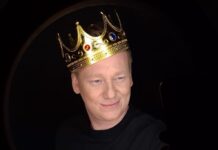| Capital: | € 8.5 million |
|---|---|
| Age: | 71 |
| Born: | July 22, 1948 |
| Country of origin: | Emden, Germany |
| Source of wealth: | actor |
| Last updated: | 2024 |
Short introduction
Otto Waalkes, often called Otto for short, full name Otto Gerhard Waalkes (July 22, 1948, Emden) is a German comedian, cartoonist, actor, musician, director and master of simultaneous dubbing. He is the author of a small elephant that was invented under the name “Ottifant” and has become a key figure in many children’s books, CDs and cartoons.
Early life
Otto grew up in the family of the artist Karl Waalkes and his wife Adele together with his older brother Karl-Heinz, who, unlike Otto, did not leave his home in Emden. The parents were devout Baptists and members of the Evangelical Free Church, whose school Otto attended Sunday school. At the age of 12 he became the owner of his first guitar, and in 1964 he first appeared with The Rustlers to perform a Beatles song. Otto was the leader, singer and guitarist. The group toured through East Frisia for five years.
Career
Otto passed the school leaving examination (Abitur) at the Emden Gymnasium in 1968 and was admitted to the faculty for art education at the Hamburg University of Fine Arts two years later. In Hamburg Otto performed for the first time on the stage of the Danny’s Pan Folk Club, where he could earn five marks for a 10-minute performance. He then lived in a flat share with fourteen neighbors, including Udo Lindenberg and Westernhagen. To finance higher education, Otto continued to take the stage in small clubs.
Otto’s own stage role was influenced by some German comedians who preceded him, such as Heinz Erhardt and Ingo Insterburg. Otto began to enrich his appearance with puns, parodies, satire, funny gestures and grimaces. In his earlier hits, Otto translated sketches from the Woody Allen programs of the 1960s and modified and shortened them slightly. The venues to which he was invited gradually became more spacious, for example the conference center Westfalenhallen in Dortmund.
In 1972 Otto Waalkes met his future managing director Hans Otto Mertens. Since no existing company wanted to publish Otto’s music, Waalkes and Mertens founded their own label “Rüssl Räckords” after a big concert by “The Rustlers” in Hamburg, with which the first LP was recorded and sold in the same year with a circulation of 500,000.
In 1973 Otto began a ten-year collaboration with the writer and artist Robert Gernhardt, first in a television show, later Gernhardt published Otto’s books and was involved in the screenplays of his films. In the following years Otto played a lot in films, dubbed the roles of various characters from foreign films (mostly animated) into German, directed his thematic shows on many German TV stations, was a screenwriter, director, author and illustrator of printed books. On August 1, 1987, Otto opened a house near the town hall of Emden in a converted old pharmacy, which is called “Dat Otto Huus” in East Frisian dialect. There is a museum on the first and second floors of this house, which contains memorabilia from the early days of Otto’s career.
In the 1989 comedy, Otto is a foreigner from Friesland. According to the plot of the film, the friendly and adventurous city guide Otto Gross lived in a lighthouse and sold the tourists a local souvenir – a mini lighthouse glued from toilet paper. Otto’s role-playing characters were: “Reporter Harry Hirsch”, “Frau Sucherbier”, “Oberförster Pudlich” and “Herbert von Karamalts”. Otto’s most famous figure was a small elephant called “Ottiphant”. Otto began to include the elephant, which was originally painted for the design of records and CDs, in comic stories that he published in various newspapers. A series of drawn cartoons were gradually created based on comics with the Ottifant and his relatives.
Career highlights
Otto is considered one of the most successful representatives of German humor. In 2004, Otto’s film “7 Dwarfs – Men Alone in the Forest” was seen by almost seven million viewers in German cinemas. In 2006 the sequel “7 Dwarfs – Forests are not enough” received the Golden Screen Movie Award.
In the television series “Our Best Comedians.” On the ZDF in 2007 Otto took one of the top three of the nominated fifty actors, including Lorio and Heinz Erhardt.
Prime Minister of Lower Saxony Stefan Weil, who presented Otto with the “Lower Saxony Order of Merit”, quoted important questions from the comedian in one of his television shows: “Where do we come from?” Where are we going? And what are we doing now? “.
The following words were heard in the 2015 anniversary exhibition entitled “Otto – born to play the fool” (Otto-Born to fool), which was shown on ZDF on the 50th anniversary of Otto’s artistic activity:
“Many of Otto’s sketches, songs, and rhymes that have long been part of a collective memory and cultural heritage are recited by heart by adults and children.”
Famous quotes
Comedy is always a game of expectation and surprise. …
And from the chaos a voice said to me: “Smile and be glad it could get worse!” And I laughed and was happy – because it got worse. …
The fact that I made my film was purely mineralogical – I needed gravel.














